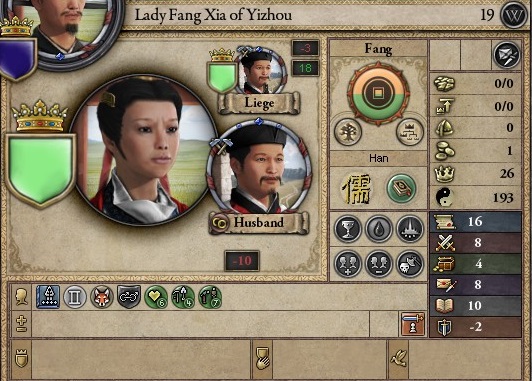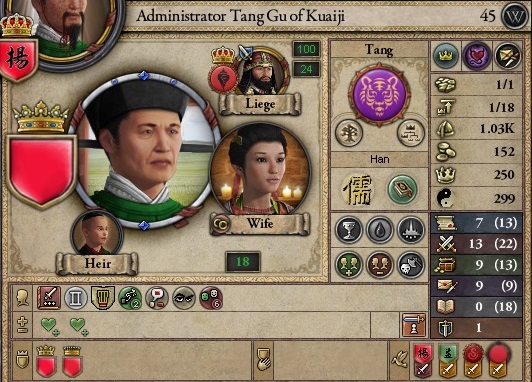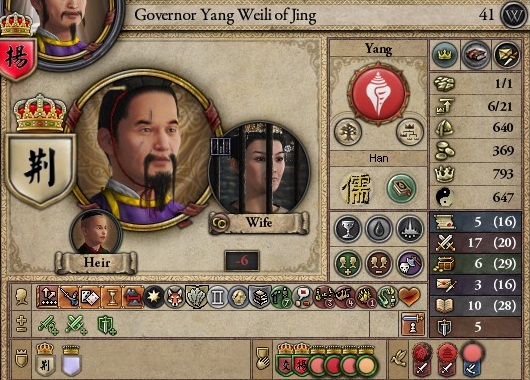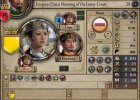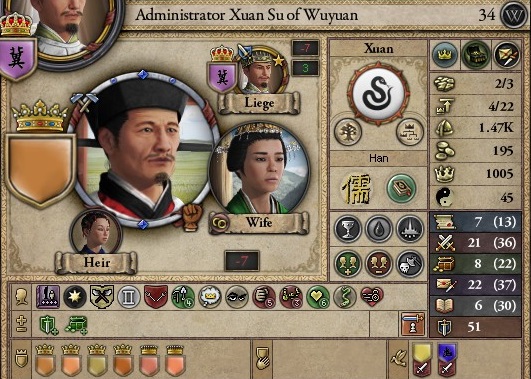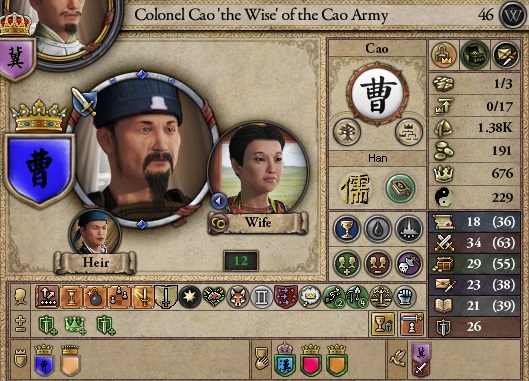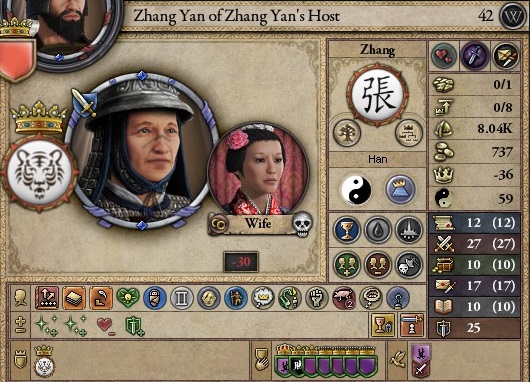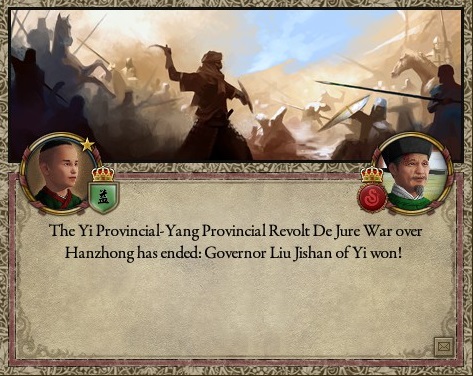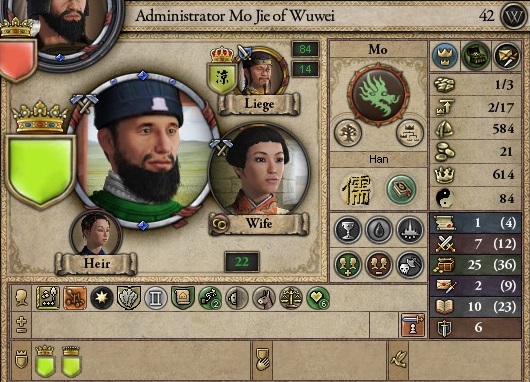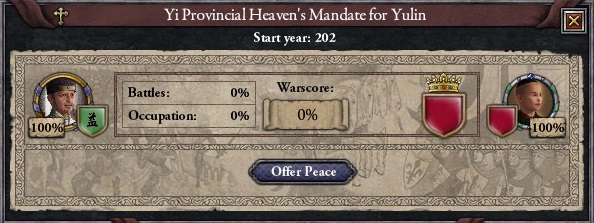200: ONE LAST RIDE

While they all celebrated the recent victory, Niu Fu was already startng to plan for a potential next campaign. He didn’t feel like he had any reason to celebrate. While the men drank and the court feasted, he only felt disappointed and restless. He loved commanding troops to serve the Son of Heaven, yet he was forced to sit here and worry about all those enemies plotting against the Dynasty out of selfish ambition. Although he tried his best to keep the court orderly, even he could see that he was failing on that front. His only way to help the Dynasty was to reclaim its lost territories. Yet here he was, serving as Chancellor instead of commanding as a general, doing so only because he feared who would replace him if he was to leave the office vacant. How could he not despair?
His grim mood didn’t stop others from celebrating the recent victory. Soldiers feasted with the citizens in the streets as they brought back loot from the campaign. Officers received praises from the Imperial Court and the Emperor himself went to the imperial tomb of his predecessors, praying and telling them: “The dark fate that has befell our Dynasty will be undone. I promise that I will bring pride back to the Liu Clan, esteemed ancestors.” The celebration at court, which took place in late January, saw everyone of importance attending, from the officers who had fought on the campaign to the Wang clansmen wishing to salvage something out of it. The Son of Heaven was of course seated at the center of all this, although to his annoyance he was not the center of attention. No, most people wanted a word with the Chancellor, who even in his bad mood couldn’t refuse such invitation. They kept asking him about his plans from now on, how he thought things would unfold, and how he planned this successful campaign. As always, he proved humble in his answers. But when Jiang Xian asked him “are you satisfied with your success?”, Niu Fu answered with a sharp thong:
“How can I be satisfied? Rebels still rule the land while disloyal officers act like they hold the Mandate of Heaven. This victory, while well deserved, did not end the chaos that threatens the Han. Yet you all act as if the danger has passed. We should be marching once again against our enemies, not rest and feast. Our loyalty will only be shown by reunifying the Dynasty, and I wish I could go back to that task this instant.”

This downed the mood of the banquet quite a bit, but it also pushed many into considering Niu Fu’s words. The Emperor certainly started to be more open to the idea of continued expansion, even if he didn’t like how popular it was making his Chancellor. Officers certainly wished to continue fighting with their great commander, who had secured their first great victory in the last five years. Even some within the Wang Clan were starting to get behind the idea of supporting such campaign, if only to steal some of Niu Fu’s thunder. Wang Hong even had the vein hope of taking command of a new campaign instead of Niu Fu. After all, he was the Grand Commandant, wasn’t he? But the fact was that he obtained the position due to politicking instead of getting it through talent, with most of the officers preferring to obey Niu Fu over him. Xu Rong even boasted that “I would resign before I obeyed one order from that imbecile!”

Traction around a new campaign quickly started to pick up. Surprisingly, one of the main agitators toward that goal was the young Empress Sun, although she had personal motives behind her support. She hoped to push for an imperial intervention to go help her father Sun Jian in his struggle with Yuan Shu. This ruffled both her husband and his closest confident, the Minister of the Imperial Household. The Emperor didn’t like how his wife was attempting to get involve in imperial politics. He already had a hard time doing so himself and didn’t want to have his wife to worry about. As for Jiang Xian, he opposed the idea bringing Sun Jian closer to the Imperial Court. He didn’t want some strongman to wrestle power away from everyone else. Dealing with Niu Fu while the Wangs were still around was already difficult. Adding Sun Jian would make everything a mess. And besides, Sun Jian was currently losing thanks to the scholar Feng Zian. In order to avoid more problem, Jiang Xian shut down the idea and made a note to find a way to neutralize this bothersome Empress.

While he was searching for a possible enemy to attack, Niu Fu also had to deal with a problematic official. Head Scholar Wang Man’s loyalty had proven fickle ever since he had been appointed to the position. First trying to align himself with Niu Fu, he then moved to the Wang Clan, then supported Jiang Xian’s before his current attempt to return into the good graces of the Chancellor, now that he was a victorious war hero. But by February the scholar had lost any good will he had with the various factions at court. The Wang Clan and Jiang Xian wanted him out due to his betrayal, while Niu Fu had always wished for a more experienced scholar to have his position. Jiang Xian thus came to the Chancellor, suggesting to appoint Wang Man to the recently vacated position of Magistrate of Xuchang. The tall official was easily able to convince court, and soon enough Wang Man was removed and sent to his new post. And this time, the new head scholar was an older and more experienced man, just as Niu Fu wanted in the first place.

In the end, the target for the next campaign decided to show itself on its own initiative. The Di barbarian tribe led by the leader Li Doumao had been greatly weakened over the years, first by their war with Yuan Shu and then due to the tribute they owed Yi Province. Seeking resources and wealth, and believing the imperial forces distracted and disorganized, they had spent the first months of 200 raiding the imperial territories on the other side of the border. This gave Niu Fu the perfect target to go against, a war to protect the Han Dynasty from its enemies. Considering that this situation needed an immediate response, the Chancellor had little difficulty convincing court of the necessity of a new campaign. Some argued that since these were tributaries of Yi Province, it would mean a conflict with imperial relatives. To this, Niu Fu retorted that these were imperial tributaries, and that the provinces shouldn’t get entangled in imperial affairs. He made a war plan with the help of Xu Rong and the other generals, leaving the capital in April 200 after he sent a messenger to warn the barbarians that he was coming.

Obviously, this news made the barbarians panic, and they quickly contacted their overlords in Yi Province. The issue was that the Governor had died just as the province was facing multiple conflicts, with his toddler son clearly too young to manage this new issue. Instead, this fell onto the laps of the regent He Xiaolong, who had already started a controversial regency by removing Pan Zheng from his office. Now he had to decide what to do with this new war, if it was worth to spend resources helping their tributaries. Generals like Hu Quan and Gao Rou, who were on the northern frontline invading Yang rebels, were all for it, as they were right next to the Di tribe. But He Xiaolong believed that with the recent powershift in the province and conflicts already underway, it was safer not to intervene. While He Xiaolong sent a strong worded letter to the Chancellor warning him to stop, he effectively stayed out of it, which greatly hindered hiss popularity among the province’s military.

Meanwhile, Jiang Xian started plotting once again the minute Niu Fu and his troops left the Luoyang. While his influence within the Censorate and the Imperial Palace had grown significantly over the recent months, he still felt that it was safer to keep the appearance of being an ally of the Wang Clan. He quickly had a meeting with Wang Hong to discuss what to do next. While Wang Hong at first suggested that they stay in the capital, Jiang Xian instead suggested that he and Wang Chen returned to their commanderies. Who knew what Niu Fu would do when he returned victorious? Maybe he would march on the capital and have them all removed by force. And it wasn’t like they could trust Luoyang’s garrison, considering how it had betrayed Dong Huang for Duan Wei half a decade before. Seeing the wisdom in his argument, the main Wang clansmen left to prepare for what they believed would be a confrontation with Niu Fu. Only the old Wang Mao stayed, but he was too arrogant to realize that they were all being played.

The campaign started on a bad foot for Niu Fu, as the army camps became ridden by Camp Fever due to bad hygiene. This led to many deaths among the troops, with some officers also contracting the disease. Sadly, this included one of the Chancellor’s most ardent supporters. In late May 200, only a month in the campaign, General Xu Rong died at the age of 38. The former officer of Dong Zhuo had survived a lot of regime changes, even switching side from Lü Bu to Dong Huang due to the machinations of Xuan Su. Since rejoining imperial service, Xu Rong and Niu Fu had developed a great amount of respect for each other. On his deathbed, the general once again pleaded his lord to turn his army around and seize power in the capital to remove all the corrupt enemies that worked against him. Always the loyal servant of the Dynasty, Niu Fu declined this last request, refusing to become a tyrant, even to save the Han.

Meanwhile, the Emperor had gotten more and more fed up with his wife. While he was all too happy with the young empress at first, Empress Sun had proven greedy and a bit too kind to those he disliked, including the Chancellor. Her insistence that the Imperial Court send help to her father also started to get on everyone’s nerves. The Son of Heaven confided in Jiang Xian, telling him about his annoyance and his problems. To this, the Minister of the Imperial Household was quick to push his monarch to divorce his wife. After all, their union had been done to ensure an alliance with Sun Jian, who was now useless to them due to his dire situation. Jiang Xian also played on the Emperor’s fears of ridicule, asking him what the court would think if he didn’t control his own family matters.

The official even had a replacement ready in the person of Concubine Duan. Duan Nuwang was the daughter of a countryside official of little importance. She had no connection at court, no talent for political affairs, and really only got into the Imperial Harem because she was pretty. In other words, the perfect puppet for Jiang Xian. The Emperor was at first hesitant, but in August finally decided to assert his authority and remove his Empress, instead promoting Concubine Duan to the now vacant position. The members of the Wang Clan, who had not been aware of Jiang Xian’s plan, sent him panicked letters when they learned of the whole affair. What in Heavens was he doing, organizing an imperial divorce? But Jiang Xian was able to calm them all, telling them that the new Empress would be far less supportive of Niu Fu, which might help them finally remove him from power. Wang Mao, who still resided in Luoyang, was convinced, while the rest of the Wang Clan could do little from their provincial bases other than hope that Jiang Xian was sincere.
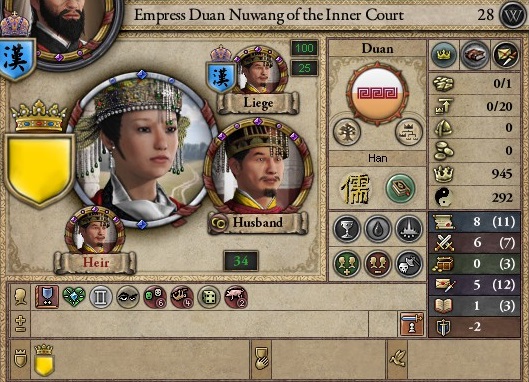
Niu Fu had little time to wonder on the Emperor’s marital life, as news of the divorce came to him just as he was approaching the barbarian territories. Fearing that the mountains would turn into a deathtrap. So he hired local barbarian guides to help his troops navigate the area. Those guides proved less than friendly, wasting a lot of his time and eventually leading him to an ambush in late October. Thankfully, while Niu Fu had believed in the guides’ sincerity, other officers like the old Zhang Ji didn’t and prepared for the eventual ambush they saw coming a mile away. Even with the advantage of terrain, the Di barbarians were outnumbered 12 to 1, and underequipped compared to the Imperial Army. The imperial forces managed to kill half of the Di warriors. Meanwhile, they only suffered 18 losses, with under a hundred men wounded during the fighting.

Sadly, the Chancellor himself was included among these statistics. In the fighting, a lucky spear found its way through his leg and into his horse. The mount fell to the ground with his rider still attached, leaving his legs battered and damaged while he was trampled by soldiers who moved around him. Thankfully, he was extorted from the battlefield before he could be accidentally trampled to death, but he was still in a bad shape. His leg was ruined, to the point that the physicians present in the camp decided that it would be simpler to just cut it off. Needless to say, that did nothing to improve his situation. For the rest of the campaign, Niu Fu was unable to lead the troops, stuck in bed suffering from his injuries. When the barbarians came to offer their surrender in mid-November, the Chancellor was unable to come receive their submission, with one of his subordinates substituting for him.

News of Niu Fu’s state reached the Imperial Capital quite fast. As Grand Commandant, Wang Hong was kept up to date with the war, and so was able to rely the state of the Chancellor to his allies before he even learned of the end of the campaign. Jiang Xian was certainly happy with this. He now had “proof” that Niu Fu had carelessly led his men into an ambush, his arrogance and recklessness having cost him his own leg. Clearly the perfect argument to feed court. Unwilling to wait for others to take this window of opportunity, Jiang Xian started to act, convincing the Emperor that he finally had a chance of freeing himself from the tyrant Niu Fu that kept him controlled. All too receptive to this, the Son of Heaven started to enact decrees on Jiang Xian’s behalf. The tall man even sent a letter to his old comrade of his, asking him to return to Luoyang to participate in his plan.
_____________________________________________

He had been running around so much today that his clothes were all crumpled. Today was a good day, a day of victory. So he better look the part. He took the time in front of the entrance gate of the Imperial Palace to straighten his clothes, which weren’t as fancy as one would have expected of someone who was on the verge of his greatest triumph. But he didn’t feel like boasting, not until everything was done and that his position was secured. And even then, he would probably simply prepare some tea for him and his wife as a way to celebrate. Nothing fancy, really.
His most recent meeting with the Son of Heaven had been quite fruitful. The young man was eating everything Jiang Xian was feeding him, all this story about giving him back the power that Niu Fu had taken from him. These regulars meeting had showed him how jealous and petty the monarch truly was as he cursed Niu Fu’s name during their talks. This was kind of sad for the tall man to see the Emperor like that. Oh did he remember how in awe he was when he sneaked into the Imperial Palace nine years ago to make the child sign his edict to have Dong Zhuo killed. At the time, he saw the ruler of China, the child who held the Mandate of Heaven with a right to rule over all. Now he had to admit that the Emperor was nothing but an overambitious petulant young man that could be manipulated like everyone else. How dreams died…

He finally moved past the guards, who he casually saluted. Being friendly to the personnel could never do him wrong on the long run, after all. He went down the stairs at the entrance, making his way out of the imperial residence. He made his way out of the palace in tranquility. He had given enough orders around that people were too busy for small talk. Which is why he was a bit surprised when he heard someone screaming at the guards that blocked his entrance into the courtyard.
“Let me through!” the old man screamed. “I need to speak with his Imperial Majesty! There must have been a mistake!”
As he got closer, Jiang Xian recognized the old Wang Mao. It wasn’t surprising that he would come to complain so fast. The old man had been a regent for the young Emperor during the last years of his childhood, all thanks to the influence of the Wang Clan. He arrogantly transitioned into a ministry once the Emperor was of age, feeling like he deserved all of this due to his long service to the Dynasty. He also treated Jiang Xian like an inferior underling, which explained why he was so rattled by the current situation.

Jiang Xian approached the guards, putting a hand one’s shoulder to get their attention.
“Jiang Xian!” Wang Mao exclaimed. “What is the meaning of this?”
“Do you need us to escort him out, Sir?” a guard asked the tall official.
Jiang Xian smiled. He always appreciated to see the results of his hard work pay out.
“I will talk with him.” Jiang Xian told them, walking next to Wang Mao and directing him away from the palace.
“So, what is it that you want to talk about?”
“I heard the Imperial decrees, as did the whole court!”
“Decrees?” Jiang Xian asked, trying his best to look as clueless as possible.
“The Emperor ordered my nephews to stay in their commanderies, barring them from entering Luoyang!”
Jiang Xian did his best to hide his relief. It seemed that the old man had kept his habit to miss most of court, instead relying on his Clan’s agents to report news to him. He was afraid that the man had heard about the removal of his nephews from the offices in the capital.
“And then the Emperor showered you with new honors!” Wang Mao continued. “By Heavens, what is happening? I thought you said that the new Empress would keep him under control!”
“The Emperor is going to dismiss Niu Fu as Chancellor.”
Jiang Xian continued to walk, not waiting for the old man to absorb the bomb he had just dropped.
“The… The Emperor…” Wang Mao fumbled.
“You wished to know what was happening.” Jiang Xian explained. “We are making our move.”
“You are behind this?” Wang Mao asked, springing out of his momentary shock. “Jiang Xian, have you lost your mind?”
“I am merely following the will of Heaven, transmitted to me by its Son.”
“And you did not consult with me on this? You should have told me, or Wang Hong! That way we would be ready to move in to fill the void. Is your brain too small to consider that you needed our approval for such action?”
“The Emperor was willful and determined. Refusing him would have weakened our position.” Jiang Xian explained, omitting the fact that he was the one to put this idea in the monarch’s head in the first place.
“Still!”
“Wang Hong authorized this.” he added.
This was a complete lie, of course. Wang Hong had actually been sending letters to everyone he trusted in the capital, wanting to know why Jiang Xian had yet to recall him and what those new decrees meant. He was probably starting to suspect that the tall official was no longer working for him and tried to warn his allies. Thankfully, Jiang Xian still had great influence within the Censorate, so his agents were all too happy to find the now former Grand Commandant’s mail and make sure that it disappeared before it reached its destination.
“Wang Hong agreed to this?” Wang Mao asked, surprised.
“Of course. He mentioned in a letter that he passed it through you.” Jiang Xian said innocently. “Did you not read it?”
Wang Mao was about to say something, but stopped himself. The old man didn’t want to complain that he had never read the letter, only to find it home waiting for him. His pride wouldn’t allow him such blunder.
“You will keep me informed of the events transpiring from now on.” was the only answer he could think of as he took his leave.
“Of course, great sir.” Jiang Xian lied.
He was happy to have dealt with this problem for the time being. While the old man was annoying and possibly a disturbance to his plans, he didn’t want to dispose of him. A man of such experience could prove quite useful in upholding the Han authority, after all.
Jiang Xian quickly left the Imperial Palace, making his way into a carriage that brought him to his personal mansion, which was closer to the entrances of the Imperial Capital. He had upgraded his living arrangements since the days of Dong Zhuo, now holding one of the most magnificent houses in the whole city. He might have been able to build an even better one close to the palace, but his paranoia kept him from it. He still remembered how easy he had been captured by Dong Huang, and how the tyrant and his allies had been trapped into the palace as Duan Wei massacred them. Better to be close to the exit if things went south.
When he arrived home, he saw his wife attending to their daughter Jiang Chang. It had now been ten years since he married Diaochan, and he still wondered how he did it. Heaven must have really been on his side to allow him to marry such a beautiful and intelligent woman. She had been supportive of his plans since the beginning, even when it meant going against her family, Then again, the Wang Clan had been as respectful of her as they had been of him, which didn’t mean much.

“Husband.” she welcomed him. “Was the meeting with the Emperor so long?”
“The Son of Heaven was quick to express his will. I had no problem there.” he explained. “No, it was Wang Mao who slowed me down.”
Her expression darkened a bit. She never really liked her adoptive uncle, and it wasn’t hard to understand why. That arrogant fool thought himself better than them, and kept reminding her how lucky she was to have been promoted from dancing girl to the daughter of an important Wang official.
“He should not be a problem.” Jiang Xian simply said.
Before his wife could say anything, the girl that was by her side walked to the tall man and gave him a slight punch in the leg. His daughter really needed to learn to reign in her willfulness. His wife clearly encouraged this attitude, so maybe a lady at court could help her with that.

“Ow!” Jiang Xian complained in an exaggerated fashion.
“Young lady!” Diaochan reprimanded her daughter, more for Jiang Xian than for herself.
“Father, you did not salute me when you arrived.” the girl complained.
“If you think it is the duty of guests to welcome others, then you still have tons to learn, Chang.”
“She is still young.” Diaochan defended.
“While our daughter might need to be taught a bit more harshly, I do not have the time nor the talent to take on that task. I have to prepare tea. We have a guest coming soon.”
Diaochan looked a bit uncomfortable, and Jiang Xian noticed how his daughter was holding in a laugh.
“What is it?”
“Your guest already arrived.” Diaochan told him. “He is waiting in the garden awai…”
The tall man didn’t listen to the rest of his wife’s explanation, racing for the garden within his mansion. He cursed Wang Mao for holding him up. For such meeting, he would have wished to be prepared and have his famous tea to serve as a good first impression. Making tea would also have helped him calm down and center his thoughts, too. Yet he now found himself racing to his backyard to meet his old friend.
Upon arrival he immediately noticed Shisun Rui seated at one of the tables, enjoying the dance performed by the dancers Diaochan left there to distract him. His former friend quickly noticed him arriving and waved to the dancers to stop, telling them to leave. They hadn’t seen much of each other ever since Shisun Rui was removed from his offices by Niu Fu, a downfall partially engineered by Jiang Xian. At the time, the two of them had chosen different sides to support, one siding with the Chancellor while the other found allies within the Wang Clan. At the time, he had done so out of necessity. Niu Fu had to be weaken for his own position to be strengthen. But now that he was firmly at the top, Jiang Xian could rekindle their former partnership. He quickly saluted his guest. He was happy to see him, but remained realistic about his hopes.

“Shisun Rui, it has been a long time.”
“My sleeping habits have been quite perturbed over the recent days.”
“Oh? Then maybe some of my tea might appease your dreams.”
“I doubt it, considering that your letter is the cause of my affliction.” Shisun Rui retorted.
“How could I have caused such issue to such an esteemed comrade?”
“I can only worry at the fear, idiotic as it is, that you might entertain the idea of stooping as low as to seize the Chancellorship from our esteemed Chancellor.”
Ha. So this discussion was not going to be as easy as he had hoped, it seemed.
“I am only acquiescing to the will of the Son of Heaven.” Jiang Xian tried to explain.
“Huhuh.” Shisun Rui answered, unconvinced. “A will you helped forged with your advices, I presume?”
“I am a loyal servant of the Dynasty, as you are. If the Emperor ask for my opinion, who am I to deny him my views?”
“You have ambition in your heart, Jiang Xian.”
“Am I really the only one? If Yang Biao had not been ambitious himself, would he have fought Dong Huang so hard? He dreamt to rebuild the Han with his own hands, which is exactly what I am trying to do.”
Mention of their late co-conspirator clearly brought back bitter memories to the both of them. Yang Biao had been the brain behind the assassination of Dong Zhuo and a key player in the following regime. The four of them (alongside Feng Fang) had become sworn brothers in their goal, and Yang Biao had done everything to build a pro-imperial regime in Luoyang. And now he was dead, with Jiang Xian and Shisun Rui the last remaining two.

“As is Niu Fu’s goal, yet you seek to have him remove.” Shisun Rui pointed out. “And unlike you, he seeks to achieve it without claiming power for himself.”
“Because he already holds it, at the great disdain of the Son of Heaven I might add.” Jiang Xian pointed out. “I sincerely do not understand why you still support him after he abandoned you like that.”
“Do not try to turn things around on me.” Shisun Rui retorted. “This might work with the fools you call your allies, but I can see beyond what I am shown. You think I am not aware how the Wangs put me on the spot, how this whole affair had your name written all over it?”
“And yet the Chancellor did nothing to protect you.”
“Because he wished for peace at court above all else, which I can at least respect. Niu Fu was faced with a difficult choice, and as much as it hurt me at the time, he did the right decision to ensure tranquility over discord.”
“And now I am offering you a new chance to serve the Dynasty.” Jiang Xian said, literally and figuratively offering his sworn brother a hand. “I need someone to assist me, to ensure justice at court.”
“So you want me to help you take control of the Han for yourself?”
“For ourselves! The Dynasty needs guiding hands, and the Emperor’s certainly won’t do.”
Jiang Xian kept his hand open, waiting for Shisun Rui to grasp it. He only retracted it when it became clear that his former associate would not take it.
“You seem to forget the righteous army of the Emperor, still fighting under the banner of the CURRENT Chancellor.”
“The Imperial Army serve the Emperor. They will submit to the new authority, and Niu Fu will surely surrender his authority.” Jiang Xian said, although he didn’t sound as confident as before. “This is the only path they have.”
“You are a fool to think that they will take it lying down.” Shisun Rui warned him. “I certainly won’t. I prefer to be forgotten by the annals of history than be remembered as a wicked villain.”
Jiang Xian decided that continuing would be pointless at this stage. His former ally had made it clear that he didn’t want to share power, to be part of a great administration that would restore the Han and make them the most powerful men in China. Let him fall into anonymity. He had more important things to do.
________________________________
Jiang Xian ignored the warnings of his former comrade and moved forward with his plan. He even tried to have Shisun Rui arrested the next day, only to find out that he had fled during the night. Paranoid at this news, the tall official quickly garnered a large garrison to bolster Luoyang’s defenses while he prepared his ascension. The Emperor, convinced that replacing Niu Fu with Jiang Xian would mean regaining control of his Dynasty, acquiesced to the plan. As Niu Fu’s subordinates finalized the submission of the Di barbarians west, the Emperor formally stripped his Chancellor from all his offices. In mid-November, Jiang Xian was made the new Chancellor of the Han Dynasty, with a mandate to bring peace and prosperity to the realm and serve the Son of Heaven loyally. Fear and panic pushed many supporters of Niu Fu to flee out of the capital, while others fled in disgust as they were demoted for their previous loyalties. All and all, Jiang Xian lost a good fourth of the court, although those left were all too willing to follow him.

The Imperial Army was on its way back when it learned of the change of regime, and they were outraged. They had just fought under Niu Fu and won a victory, only to learn that their righteous commander had been punished for his loyalty. Had he been in full shape, the former Chancellor might have put down any thoughts of dissention. But in his injured state he was unable to control his officers, who made a pact to avenge this insult and march on the Imperial Capital to restore Niu Fu to his righteous place. They first made it to the western capital of Chang’an, still ruled by the Niu Fu loyalist Chang Xia. However, that’s as far as the army made it. Their leader, already depressed and stressed, simply did not have the will to continue. On December the 5th, 200, Niu Fu succumbed to his injuries at the age of 40, still as loyal as ever to the Han Dynasty.

If Jiang Xian might have hoped that the death of Niu Fu would have ended the conflict, then he was soundly disappointed. The death of Niu Fu only enraged the officers even more, who were joined in Chang’an by most of the provincial officials, all disgusted by Jiang Xian’s power grab. It soon became clear that the entire of Sili Province refused to recognize the new Chancellor, who found himself with little control outside of Luoyang. Still, the generals had no clear leader to coalesce around. Wang Hong and his clansmen tried to take over the movement, as did Shisun Rui in his last attempt at historical relevance. But neither of those well-known men were chosen, the officers instead going for the relatively unknown fifty years old Jiao Jiao. The records don’t agree on why they chose Jiao Jiao. Some say that he was a comprise candidate, while others claim that the generals wanted someone that they could manipulate easily. It has also been advanced that they thought that they were selecting the more respected Cao Cao to lead them, and were too embarrassed to correct things off when they realized their mistake.

Jiao Jiao, who had enjoyed his obscurity so far, tried to refuse the honor. He was afraid of the dangers that would befall him once he took the position. But the acclamation insisting that he take over the province were too loud, and those that opposed it (like the Wang Clan) decided that they could surely maneuver themselves into power under such fool. So Jiao Jiao agreed, becoming the Governor of Sili Province with the goal of preparing a campaign to remove Jiang Xian and avenge Niu Fu’s humiliation. Meanwhile, the new Chancellor could only watch in fear as he lost control of the majority of the Han territories. He now had to deal with the former Imperial Army planning to come for him, a Capital that surely still had sympathizers to his enemies and a brash young Emperor who believed that he was about to be given full powers. Not a great start to his new perfect regime…

__________________
PS: So I could have posted this chapter 3 days ago, but I decided to hold onto it for today, as it has been 1 year since I started this AAR (as @Midnite Duke pointed out).
And yeah, things have changed a lot in the story since then! A decade has gone by and all most of the characters have moved on and change, with a few of them being big players throughout China. In fact, most of the current big players weren't in charge at the start of the story. Gongsun Zan was under You Province. Yang Weili was serving Chen Wen. Jiang Xian and Yao Shuren both served under Dong Zhuo. I'm amased of the turns that the story has taken.
I'd also like to thank anyone who followed this story so far. I hoped you enjoyed the ride so far as much as I did, and hope to see you around for the rest of it.
Attachments
- 2
- 1





















